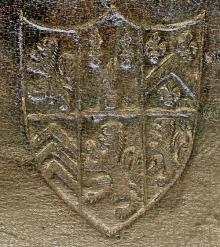Cromwell, Oliver (1599 -1658)
Oliver Cromwell, Lord Protector of the Commonwealth of England, Scotland and Ireland, was the second son of Sir Robert Cromwell of Huntingdon, and Elizabeth, daughter of William Steward. His father was the second son of Sir Henry Cromwell of Hinchingbroke, son of Richard Williams who assumed the name Cromwell in honour of his uncle and patron Thomas Cromwell, his father, Morgan Williams, having married Cromwell's sister Katherine. Oliver Cromwell was educated at Huntington Grammar School and Sydney Sussex College, Cambridge, where he matriculated 23 April 1616 but took no degree. On the death of his father in 1617, he entered Lincoln's Inn. On 22 August 1620, he married Elizabeth, daughter of Sir James Bourchier, of Tower Hill, London, a merchant, and entered Parliament as Member for Huntingdon in 1628. In 1640, he sat for Cambridge, and took a major part in the events that started the Civil War, serving as Captain of a troop of horse in Essex's army at the Battle of Edgehill. By 1643 he was a Colonel. In August, the House of Commons made him Governor of the Isle of Ely, and one of the Colonels of Horse in the new army raised by the Earl of Manchester. In 1644 he became Lieutenant General, under the newly appointed General Fairfax, and took a distinguished part in the campaigns of the new model army. After the surrender of the King, it was Cromwell who pacified Scotland, and he was the first among those who signed the death warrant of Charles I in 1648. After the death of the king, Cromwell was sent to subdue Ireland, which he did with great ferocity, in 1650, he was made General of the Parliament's forces in place of Fairfax, and again subdued Scotland, and in 1651 finally defeated the Scottish forces at the Battle of Worcester. In 1653, as a result of the disorder of Parliament, he was made Lord Protector by the army, an office which he accepted with reluctance. John Hingston, a pupil of Orlando Gibbons, was a composer and organist successively in the service of Charles I, Cromwell and Charles II. Cromwell is said to have been particularly fond of his playing. Hingston was also tutor in music to Cromwell’s daughter.

